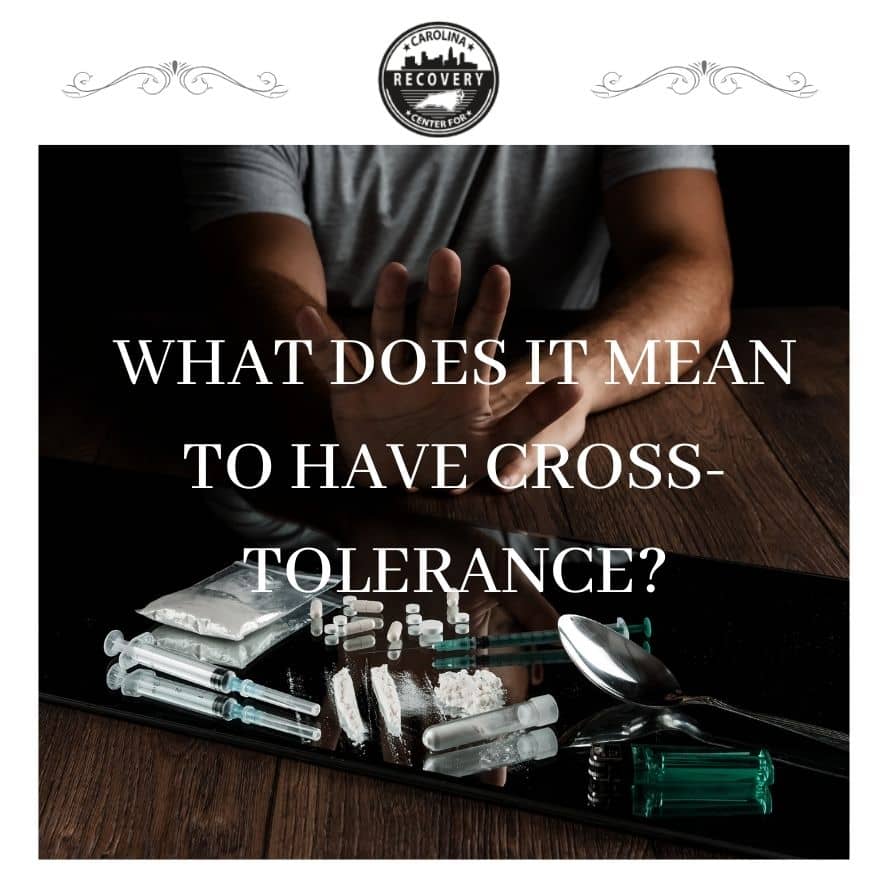What Does it Mean to Have Cross-Tolerance?

Medically Verified: 2/1/24
Medical Reviewer
Chief Editor

All of the information on this page has been reviewed and verified by a certified addiction professional.
What is Cross-Tolerance?
Drug tolerance, or tolerance, develops after regular substance abuse and refers to the body becoming less sensitive to the effects of a specific drug. If you have developed drug tolerance, you will have to take higher doses of the drug to experience the same effects as before.
Cross-tolerance occurs when you develop a tolerance to a specific drug which translates to a tolerance of similar types of other drugs. For example, someone who abuses heroin, an illicit opioid, may develop a tolerance to heroin as well as a tolerance to prescription opioids that affect the brain in the same way as heroin.
Since drugs that belong to the same class affect the brain and body in similar ways, it is possible to develop tolerance to other drugs in the same drug class as the drug you have been abusing.
There are two types of cross-tolerance, with the latter being the most severe:
- Incomplete cross-tolerance – Occurs when the effects of medications are reduced, but not entirely ineffective.
- Complete cross-tolerance – Occurs when the effects are completely removed, even at high doses. This is common in people who are struggling with cross-dependence and addiction.
Drugs Classes Where Cross-Tolerance May Occur
In most circumstances, cross-tolerance involves drugs that belong to the same drug class or produce similar effects on the brain and body. For example, someone who abuses oxycodone will also develop a tolerance to hydrocodone.
The most common drug classes that people may develop cross-tolerance to are:
- Opioids – Opioids are pain-relieving medications such as hydrocodone, oxycodone, codeine, morphine, methadone, and more. There are also illicit opioids, like heroin and illicitly-manufactured fentanyl. People who get addicted to prescription opioids often switch to stronger opioids like heroin or fentanyl to continue experiencing euphoria due to the tolerance they develop. However, someone who has been abusing prescription opioids will have a tolerance for heroin, too, so they will have to take a higher dose of heroin than someone who has no opioid tolerance would in order to experience a high.
- Sedatives – Sedatives include benzodiazepines, barbiturates, alcohol, and sleep aids. All of these medications slow down central nervous system activity and act on similar receptors in the brain. As a result, people who use one of these substances heavily may have a cross-tolerance with another sedative. For example, it is common for people who abuse Xanax (alprazolam) to also be tolerant of Klonopin (clonazepam), Valium (diazepam), Ambien, and more.
- Stimulants – Stimulants increase activity in the central nervous system and include drugs like amphetamine, methamphetamine, Adderall, Vyvanse, Ritalin, MDMA, and more. People who are addicted to one stimulant may also have drug tolerance for other stimulants.
- Psychedelics – Psychedelics including psilocybin mushrooms, LSD, DMT, and peyote can lead to cross-tolerance.
- Antihistamines – Some antihistamines can cause cross-tolerance. For example, Benadryl and hydroxyzine (Vistaril) act on histamine in the same fashion, so people who abuse one medication will develop a tolerance to the other.
- Corticosteroids – Certain corticosteroids can result in cross-tolerance if they are used long-term.
Cross-Tolerance Among Different Drug Classes
While cross-tolerance usually occurs among drugs belonging to the same class, it can also occur among a few substances in different drug classes.
- Marijuana (cannabis) and sedative drugs – Marijuana acts as a depressant on the brain, producing feelings of calm and relaxation. Chronic marijuana abuse can result in cross-tolerance with other sedatives like alcohol and barbiturates.
- Nicotine and stimulants – Nicotine is a stimulant, and heavy nicotine use can lead to cross-tolerance with stimulants like Ritalin or Adderall.
- Nicotine and alcohol – People often develop a cross-tolerance to nicotine and alcohol because people who drink heavily are often introduced to smoking cigarettes, causing them to develop an addiction to both substances. In addition, smoking and drinking alcohol are common in many American bars and are seen as a way to socialize or relax.
Understanding the Dangers of Cross-Tolerance
Cross-tolerance can lead to cross-dependence. Dependence occurs when your body relies on the presence of a substance to function normally. If you are physically dependent on a substance, you will experience withdrawal symptoms if you stop taking it.
Many people become so desperate to avoid withdrawal symptoms that they continue using the drug(s) they are dependent on, resulting in increased tolerance and the development of an addiction.
Tolerance not only increases the risk of addiction, but it can also increase the risk of overdose. As one’s tolerance grows, they may take increasingly large doses of the type of drug they are addicted to. Accidentally taking a dose too large or too potent can easily result in an overdose.
Overdoses often occur when people develop a cross-tolerance to opioids. When prescription opioids are no longer producing the desired effects due to tolerance, people often switch to heroin or fentanyl because they are stronger. However, heroin and fentanyl are not regulated by the FDA and can range in potency greatly. As a result, it is impossible to regulate how much is being taken, and overdose becomes likely.
Find Addiction Treatment Today
If you or a loved one have been abusing drugs and have developed cross-tolerance or cross-dependence, you may be struggling with addiction. But with the right treatment and support, anyone can achieve recovery.
Carolina Center for Recovery is a state-licensed and CARF-accredited substance abuse treatment facility. We are a dual-diagnosis facility with a primary focus on substance abuse. Family-owned and operated, we take pride in our commitment to healing families as a whole. Recovery is not only for those who have abused drugs and alcohol but also for those who have suffered the trauma of loving someone with substance use disorder.
To learn about your treatment options or to find help today, please contact our team now.

